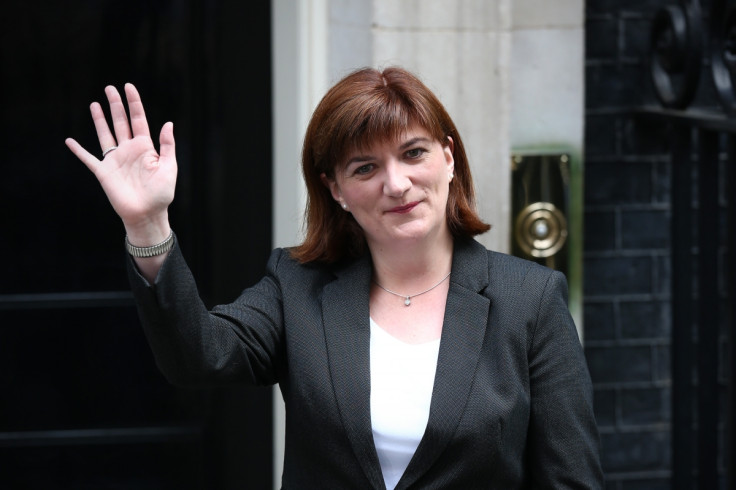EU Referendum: Enough of the threats - give us some positive reasons for voting either way

OK, so Nicky Morgan didn't quite offer a karaoke version of Whitney Houston's The Greatest Love of All ("I believe the children are our future/Teach them well and let them lead the way"), but by the sounds of it she got pretty close.
The secretary of state for education was speaking at the Fashion Retail Academy in London, where she warned about the dangers of an "out" vote in June's referendum on the UK's continued membership of the European Union.
"When you cast your vote, remember that you're making a decision on the future of this country and shaping our country for generations to come," she said. "I'd ask you to think about the impact of that vote, not just on your lives, but on that of your children and grandchildren."
And in case we were in any doubt about it, Morgan reminded us about the virtues and qualities of young people today as she sees them. "This is the generation of Instagram, easyJet and eBay," she said. "They don't want to see a Britain cut off from the world, where not only their opportunities, but our influence as a country, ends at our shores.
"Young people today want to see the UK working internationally to tackle the big problems and issues that they care about because they want to make their world a better place."
Read Caroline Lucas on the EU: Young people must not sit by as we sleepwalk into Brexit
Couldn't any of these assertions be used to support a vote to leave the EU as well? Are older voters (the real target of Morgan's speech) so casual about future generations that they will cast their votes thinking only about the short term rather than the long term?
There are 12 more weeks of campaigning to go until June 23. But today's contribution from the StrongerIn camp, as with the Vote Leave threats of rampant criminality from marauding EU citizens, repeats the same mistake. It is all about negativity, threat and fear. Few positive reasons are being offered for voting one way or another. It is all about rejecting the obvious awfulness (and mendacity) of the other side.
Both camps, it seems, are persuaded by the election strategists' orthodoxy, which says that fear and negativity work. And, indeed, sometimes they do. The implosion of LibDem support (and Labour's poor showing) in last year's general election seems to have had something to do with fear of a Labour/SNP coalition government. In the Scottish referendum on independence in September 2014, fear of the possible consequences of breaking free seems to have kept the No share of the vote safely in majority territory.
It is another cliché, or truism, of referenda that the status quo tends to win the day. So whatever opinion polls say over the coming weeks – and they seem to be getting tighter at the moment – the Remain side should cling on, especially, the thinking goes, if enough fear about leaving can be spread.
The conventional wisdom may be wrong, however. Scepticism about the messages carried in "mainstream media" is spreading. So facts and excessive claims are met with equal and opposite facts and excessive claims, leaving voters none the wiser, or any more convinced. And while negativity may be an effective way of keeping your opponent's vote down in a general election, on June 23 turnout, which will as usual be decisive, may be affected by different concerns. Brexiteers stirred up by scares and negativity may be more likely to vote than complacent Remainers, who simply assume that their "common sense" views will win out.
If they want to win the In crowd are going to have be brave, a lot braver than Nicky Morgan was on Tuesday morning. They will have to reflect the views offered in a speech by Labour's Alan Johnson in Glasgow recently.
He invoked the post-war vision of Jean Monnet and Robert Schumann, the founding fathers of today's EU. Monnet and Schumann supported the construction of a collaborative, peaceful Europe in which wars would become impossible.
"We depend on our EU membership for jobs, security, for workers' rights, consumer protection and tackling climate change," Johnson said. "So perhaps it's no real surprise that Monnet's original idea – a European union for a permanent peace – has faded into the background. We have lived at peace for so long that we've developed a whole new set of problems to worry about. But we forget our history at our peril.
"Modern-day Eurosceptics like to pretend that the European Union has nothing to do with Europe's lasting peace," he went on. "They say we should forget about that particular chapter of history because war between the nations of Europe is now inconceivable – exactly as Schumann and Monnet predicted it would be 70 years ago."
Maybe "the kids" are not interested in 70-year-old stories about the origins of the EU. But you can bet a lot of older voters still are. And they, don't forget, tend to be the people who vote in the largest numbers.
To stay in the Remain campaign needs to start singing a positive song for Europe.
© Copyright IBTimes 2025. All rights reserved.






















